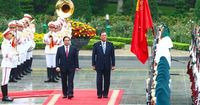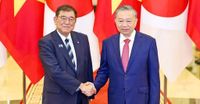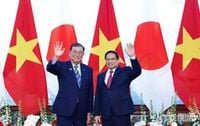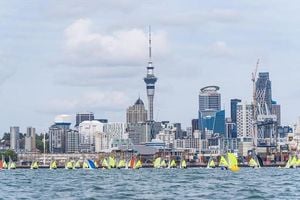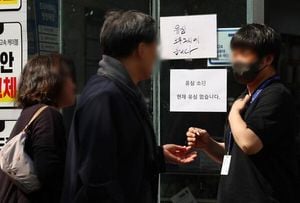On April 28, 2025, Vietnamese Prime Minister Pham Minh Chinh hosted a welcoming ceremony for Japanese Prime Minister Ishiba Shigeru and his wife, Ishiba Yoshiko, at the Presidential Palace in Hanoi. This visit marks Ishiba's first official trip to Vietnam since taking office, and it is also significant as it is the first visit by a Japanese Prime Minister following the upgrade of bilateral relations to a "Comprehensive Strategic Partnership for peace and prosperity in Asia and the world" in November 2023.
During the ceremony, both leaders expressed their satisfaction with the robust and comprehensive development of the Vietnam-Japan partnership over the past year. The two Prime Ministers highlighted the importance of enhancing cooperation in various fields, including economic, cultural, and educational exchanges.
The visit commenced on April 27 and will continue until April 29, 2025. Prior to the welcoming ceremony, Prime Minister Ishiba paid tribute to the late President Ho Chi Minh by laying a wreath at his mausoleum and commemorating the heroes and martyrs at the Monument to Heroes and Martyrs.
At the ceremony, both leaders participated in a flag salute, reinforcing the ceremonial bond between the two nations. Following the ceremony, they moved to the Government Headquarters for high-level talks aimed at deepening bilateral ties.
Among the highlights of the visit was the exchange of several key cooperation documents. A Memorandum of Understanding (MoU) was signed between the Vietnamese Ministry of Science and Technology and the Japanese Ministry of Education, Culture, Sports, Science and Technology, focusing on collaboration in research and development within the semiconductor field. Additionally, another MoU was established between the Vietnamese Ministry of Education and Training and the Japanese ministry aimed at developing human resources in the semiconductor industry.
Furthermore, a Framework Agreement was exchanged regarding the teaching of Japanese in Vietnamese general education schools, signifying a commitment to cultural and educational exchange. Another MoU was signed between the Vietnamese Ministry of Industry and Trade and the Japanese Ministry of Economy, Trade, and Industry to promote bilateral cooperation projects in the field of energy transition.
"Japan continues to be Vietnam's leading important economic partner, and cooperation in new fields such as green transformation and digital transformation has progressed with many specific projects," said Prime Minister Chinh during the talks.
Japan is currently Vietnam's largest provider of Official Development Assistance (ODA) and has invested significantly in various sectors. As of March 2025, Japan had 5,557 active investment projects in Vietnam, with a total registered capital exceeding $78.6 billion.
In 2024, bilateral trade turnover reached an impressive $46.2 billion, underscoring the strong economic ties between the two nations. Notably, Japan is also the fourth-largest trading partner for Vietnam in terms of tourism.
During the discussions, both leaders emphasized the need for enhanced cooperation in strategic areas, including digital transformation, green energy, and semiconductor industries, as well as initiatives aimed at reducing carbon emissions. Prime Minister Ishiba reiterated Japan's commitment to supporting Vietnam's development goals, stating, "When aiming for high economic growth, Japan will continue to accompany Vietnam as an irreplaceable partner."
In the context of global economic challenges, both nations are keen to strengthen their partnership. The visit by Prime Minister Ishiba is seen as a strategic move to solidify ties and promote mutual interests amidst an evolving international landscape.
"Not only does Prime Minister Ishiba choose Vietnam, but Japan chooses Vietnam as a destination," remarked Yuko Obuchi, a member of the Japanese House of Representatives, highlighting the significance of this visit in the broader context of Japan's foreign relations.
The visit also aims to address pressing global issues such as climate change and disaster response. The two leaders discussed potential collaborations to tackle these challenges effectively, reinforcing their commitment to sustainable development.
As part of the ongoing partnership, Japan has pledged approximately 2,550 billion yen (over $23 billion) in ODA to Vietnam by the end of the fiscal year 2024. This funding is expected to support various infrastructure projects and initiatives that align with Vietnam's strategic development goals.
Moreover, cultural exchanges remain a vital aspect of the Vietnam-Japan relationship. There are currently over 51,000 Vietnamese students studying in Japan, and the Vietnamese community in Japan has grown to over 600,000, making it the second-largest foreign community in the country.
The two nations have also successfully organized numerous cultural festivals, including the Vietnam Festival in Japan and the Japan Festival in Vietnam, fostering goodwill and mutual understanding between their peoples.
As the visit progresses, both leaders are expected to engage in further discussions on enhancing trade, investment, and cultural cooperation, aiming for a more prosperous future for both nations. The ongoing dialogue reflects the commitment of both countries to build a strong, sustainable partnership that benefits their respective populations and contributes positively to regional stability.
In conclusion, the official visit of Prime Minister Ishiba Shigeru to Vietnam represents a pivotal moment in the bilateral relationship, providing a platform for deeper cooperation and mutual growth. The discussions and agreements reached during this visit are set to pave the way for a new era of collaboration between Vietnam and Japan.
